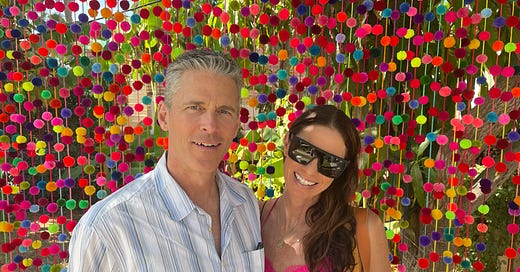I’ll start with the punchline.
The most useful “second home” may be a place that allows the oldest person in the family tree to live closer to the younger members.1
In Part Two of Core Capital, I wrote about real estate as a form of life insurance. Specifically, purchasing a two-unit rental property that would enable my family to “live for free” if I died in my 40s.
I closed that article by explaining the the cash flow from the investment enabled me to spend more time with my family.
The strategy was:
to use capital to free up time
to be wary of investments that boost consumption
In Colorado, the classic purchase that boosts spending is a ski place. So far, I’ve stayed variable with respect to skiing. I’m glad I did. As my kids age into year-round sports, we’re not able to ski as much as we did when they were little (5-12 yo).
Longevity Insurance
The rental property (above) insured my family against the risk of my early death. There’s another risk we face…
What if I don’t die?
Insuring longevity risk is my topic today. I see this issue differently than most.
From Part Five:
The smartest “old folks” I know are surprised with how their lives changed on the far side of 70. Not just physical changes. They are most surprised by changes to their values, desires and priorities.
While our values may change, we can be certain that, in our final decade, we will have much in common.
A Desire For…
Simplicity in Living
Access to Reliable Medical
Proximity to Family
Simplicity
My “day job” is managing complexity. I am comfortable with tax, legal and accounting frameworks around the world.
This rubbed off into my personal life. When I left Private Equity (2000), my financial life was scattered around the world.
Before landing in the US, I simplified my life.
But my life is not simple.
Nor is it simple enough for my spouse to step into my shoes at short notice.
The hassle of complexity runs deeper than protecting our spouses.
There’s something I know about my future self. I have a good idea what he’s going to be like.
I watched all four of my grandparents pass, and three of my great-grandparents.
I took care of my grandmother’s finances in the last years of her life. Gradually, then suddenly, she lost interest in them.
Fortunately, she had the foresight to simplify, and put me in place to help her. She made these arrangements a decade before she needed them.
I intend to follow her example.
Medical
Like most males my age, I had been ignoring this.
What drove home a need for quality medical was reading this article by Joe Friel as well as my history with Ron Ottaway.
Both Joe and Ron are exceptional athletes - what I call a SuperVet. They’ve maintained exceptional fitness through their 70th birthdays. Then, across their 70s, they dealt with issues many of us run into in our 60s.
While we can delay, we can’t avoid.
What’s the medical like where your family members live?
Proximity To Family
Until the first spouse dies, most elder couples figure it out between the two of them. When we are alone, we’re want reliable people close to us.
Some ideas from the smarter members of my peer group:
A friend bought his mother-in-law a place across the street. It worked great, for everyone. When his kids were little they always had a responsible adult nearby.
Another 80+ friend of mine, rotates hemispheres between his adult kids. Moving between Arizona and South America, in line with the seasons.
Our policy is “Close But Not Too Close.”
This was taught to me by another friend. His extended family makes an effort to get together once a quarter. They gather three generations of adults, plus spouses. By avoiding “too close” they’re able to keep the gatherings meaningful for everyone.
Timing
My Dad has a great take on all this.
I saw the issues clearly but if I’d acted on them, I would have moved to the wrong place.
It’s a great point.
We have no idea how the future will unfold.
Knowing this, I closed Part Four with...
Allocate the minimum capital to solve the current situation
Thereby maintaining flexibility for the future
I’m assuming I will want to live close to one of my (adult) kids and help raise my grandkids. I plan on letting that future unfold and see what happens.
It’s a reason for me to “stay variable” with my hobbies2 and maintain the flexibility to relocate later in life.
We don’t need to own the location for it to prove useful.
Stay Variable. It can be tempting to capitalize luxury expenses. Time shares, lake houses, ski places, boats, recreational vehicles… are all examples. If we allocate towards these purchases then we might not have the capital available to purchase a condo near the most reliable member of the generation below us.




